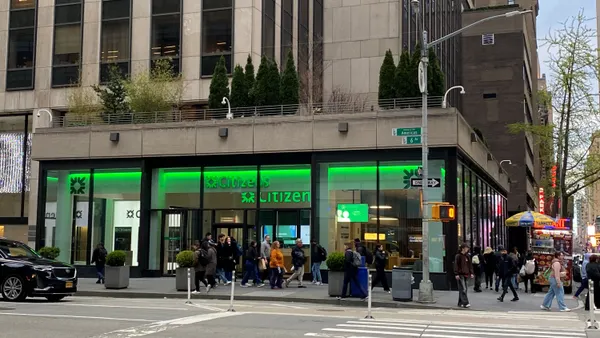Dive Brief:
- The Consumer Financial Protection Bureau has dropped its case against SoLo Funds, the fintech the agency sued last May for deceiving borrowers over the true cost of loans on its platform.
- The joint stipulation to dismiss the case against the Los Angeles-based company was filed Friday and signed by Mark Paoletta, chief legal officer for the CFPB and general counsel for the Office of Management and Budget.
- Russ Vought, the CFPB’s acting director who also leads the OMB, said the bureau “shockingly” tried to “destroy” SoLo, “which incurred millions in legal fees and had to lay off 30% of its workforce,” he wrote in a Sunday post on social media site X. “It was wrong and we dismissed the case. More to come but the weaponization of ‘consumer protection’ must end.”
Dive Insight:
The dismissal of the bureau’s lawsuit against SoLo reflects the CFPB further distancing itself from former director Rohit Chopra’s actions, in the wake of President Donald Trump’s return to the White House.
It’s been a tumultuous month for the CFPB, which has been infiltrated by the Department of Government Efficiency and experienced a change in leadership and an attempt by the Trump administration to gut the bureau’s workforce. (A judge has halted those firings, for now). Vought also ordered the bureau to cease all work activity, and the CFPB’s enforcement and supervision chiefs stepped down.
Earlier this month, the bureau had sought to pause the case against SoLo, filed in U.S. District Court for the Central District of California, while conducting a review of its enforcement actions. SoLo, however, objected and a judge denied the CFPB’s request Feb. 5, “for no good cause shown.”
The CFPB, under the Biden administration, took issue with SoLo’s “tip” structure, which obscured the total cost of loans, since borrowers are prompted to tip lenders and make “donations” to SoLo. The CFPB also said SoLo, which marketed itself as a consumer-friendly alternative to pricier, short-term loans, hid from borrowers the option to forgo a tip, and offered loans to borrowers in states that require platforms to have a license.
SoLo has said it had long since changed some components of its display the CFPB called out in the lawsuit.
In a response to the CFPB’s action last May, SoLo said it had been “voluntarily working with the CFPB for the last 18 months, attempting to work toward a regulatory framework that maintains its affordability for Americans.” The two had “primarily agreed on a path forward” but “unbeknownst to us, we were blindsided the next morning with a suit.”
When contacted Monday for comment on the lawsuit’s dismissal, a spokesperson for SoLo pointed to a news release that said the company “welcomes” the development.
“In deciding to bring this case against SoLo, the CFPB sought to shut SoLo down so underserved consumers could not get help to finance necessities such as groceries, rent, and utility bills,” said Travis Holoway, the fintech’s CEO, in the release. “SoLo is thankful that when they examined the evidence in the case, they saw the benefit of SoLo’s innovative model. We remain hopeful that innovation will be rewarded where the goal is fostering competition and lowering consumer costs.”
State attorneys general have also taken aim at SoLo’s practices: Former Pennsylvania Attorney General Michelle Henry last July reached a settlement with SoLo that required the company to pay $158,000 in restitution, $25,000 in civil penalties, and about $25,170 in investigation costs. The fintech was also required to modify its business practices in the state and cease all collection efforts. SoLo has also entered into settlements or resolutions with regulators in California, Connecticut and Washington, D.C.
A proposed class-action lawsuit was also filed against the fintech last October, claiming SoLo misled consumers by falsely advertising its loans had zero interest and no hidden fees.
“The Trump-Musk crowd has sided with the powerful fintech predators and not the people who have been cheated and scammed and is sending a clear message that fintech predators have a green light to rip off their customers,” Christine Chen Zinner, senior policy counsel at the progressive nonprofit Americans for Financial Reform, said in a Saturday blog post.












